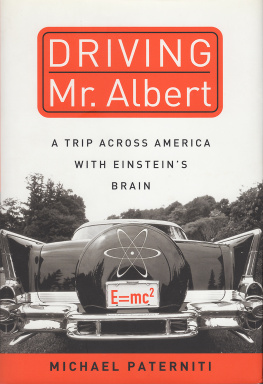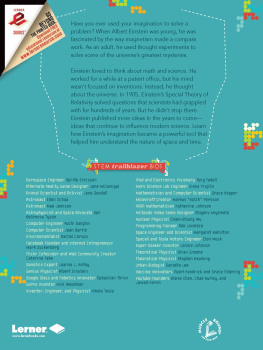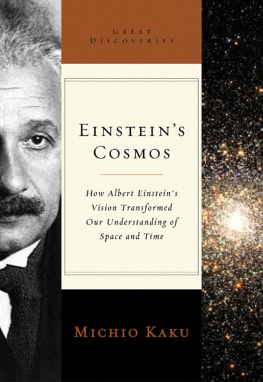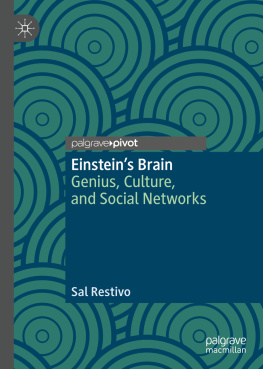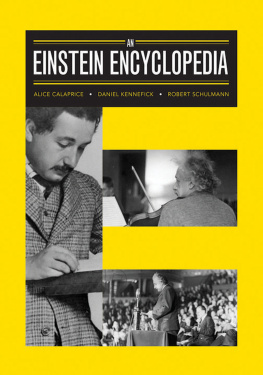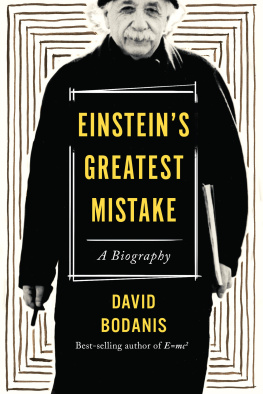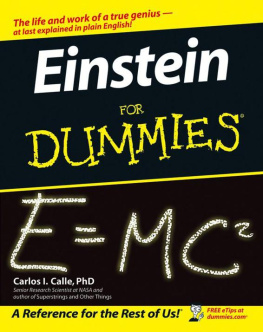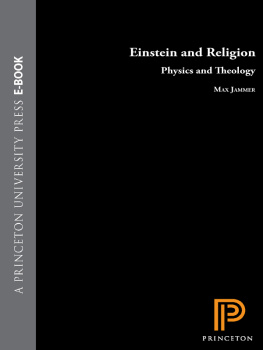Driving Mr. Albert
A Trip Across America with Einstein's Brain
Mi chael Paterniti

THE DIAL PRESS
Published by THE DIAL PRESS
Random House, Inc.
1540 Broadway New York, New York 10036
Copyright 2000 by Michael Paterniti
All rights reserved. No part of this book may be reproduced or transmitted in any form or by any means, electronic or mechanical, including photocopying, recording, or by any information storage and retrieval system, without permission in writing from the Publisher, except where permitted by law.
The Dial Press is a registered trademark of Random House, Inc., and the colophon is a trademark of Random House, Inc.
Library of Congress Cataloging-in-Publication Data
Paterniti, Michael.
Driving Mr. Albert: a trip across America with Einstein's brain/Michael Paterniti.
p. cm.
ISBN 0-385-33300-5
1. Harvey, Thomas Stoltz. 2. Einstein, Albert, 1879-1955.
3. PathologistsKansasBiography. 4. BrainDissection. I. Title.
RB17.H365 P38 2000
616.07'092dc21
[B] 00-024030
Manufactured in the United States of America
Published simultaneously in Canada
Designed by Virginia Norey
July 2000
10 9 8 7
BVG
For Sara and Leo, all the days and nights of us yet to come
And in memory of Peggy Fulton Corbett
It was a splendid mind. For if thought is like the keyboard of a piano, divided into so many notes, or like the alphabet is ranged in twenty-six letters all in order, then his mind had no difficulty in running over those letters one by one, firmly, accurately, until it had reached, say, the letter Q. He reached Q But after Q? What comes next? After Q there are a number of letters the last of which is scarcely visible to mortal eyes, but glim mers red in the distance.... How many men in a thousand million, he asked himself, reach Z after all? Surely the leader of a forlorn hope may ask himself that, and answer, without treachery to the expedition behind him, "One perhaps." One in a generation.
Virginia Woolf, To the Lighthouse
Prologue The White Rabbit
To be honest I thought the road trip would be a caper. That's what I imagined. And I thought the old doctor was a true eccentric, which would be entertaining. And yet desire is a tricky thing. It can change a quick outing to the store for milk into a lifelong, shoeless quest through the Himalayas in search of enlightenment. It can put you on the road to Canterbury without your realizing it at first. And some version of that is what happened.
I first heard the story of Albert Einstein's brain as an urban myth too weird to believe. A friend had a friend who'd heard about it from someone else living in Roswell or Sedona or somewhere like that, a bit of geographical detail that was meant to lend either credibility or incredibility to the yarn, I couldn't tell which. My friend told me about it during a commercial break while we were watching the Gulf War, which would have made me about twenty-five years old at the time. And somehow, the war and the brain conflated in my mind. Even now, when I imagine Einstein's dendrites and neurons firing as his brain lit upon relativity, I picture Baghdad, with its minarets and modern-antennaed buildings sparkling beneath thousands of phan-tasmagorical tracers, under Allied attack on a very dark night.
The tale went like this: Einstein died in 1955 and, during an au topsy, his brain was removed from his head, ostensibly to be studied for the keys to its genius. But then, after some years, the brain sup posedly disappeared. Rumor had it that it had been cut up and parts of it resided somewhere in a garage in Saskatchewan, next to the bas ketballs and hockey sticks of some oil rigger's kids, collecting dust. Other parts were said to belong to the doctor who did the autopsy, an odd man who had since vanished.
I loved that, the Canadian stash, the weird immortality of the brain, its allegedly bizarre keeper. As time passed, I began to repeat the story of Einstein's brain to friends and acquaintances adding my own flourishes. The old doctor with Einstein's brain now occasion ally wore an eye patch or was a hunchback. Sometimes, he was pur sued by secret agents or ex-lovers with an ax to grind, which kept him moving from town to town. In other versions, he was looking to sell the brain on the black market. Only later would I find out how close I'd been to certain kernels of the truth.
As time passed, I thought less and less frequently about Einstein's brain, filed it in life's arcana file. But several years later, living in New Mexico, I struck up a friendship with my landlord, a man named Steven, who randomly happened to be friends with the writer William Burroughs. A veteran of all things cool and outre, Steven often watered the flower garden in his adobe compound where I lived. When I told him about Einstein's brain, he didn't even blink. "Yeah, the guy with the brain lives next to William in Lawrence, Kansas," he said.
I thought he was putting me on. "He what?" I said.
"Yeah," he said. "He used to be a pathologist." Then he kept spray ing his snowdrops and daffodils with the hose, unfazed.
"Like ..."
"... lives next door?" Steven said, completing my sentence. He looked at me sideways with the slightest trace of pity. "Yeah, the doc's a real trippy dude, but they've hung out."
"Trippy dude?"
"Weird cat."
Oh, trippy dude and weird cat. How weird? Weird in what way? Like Norman Bates or Boris Karloff weird, with a basement full of smoking potions and beakers of fluorescent liquid and some strange Frankenstein cloning experiment in progress? Like August Strindberg, in dementia, trying to turn lead to gold? Or weird as in culturally accepted, iconoclastically weird, a cult figure like, say, Burroughs himself, or a shaggy Indian mystic like Rabindranath Tagore?
"I don't know," said Steven, but then he offered to get the old doc tor's number for me, from Burroughs himself. Which he did, deliv ered on a slip of paper torn from a notebook. And I immediately pinned it to the bulletin board near my desk at work, stared at it for a month, then just started dialing. As I went through my days working as a magazine editor, I'd look at that number and, for no justifiable reason, I'd pick up the phone and dial. The line rang but no one answered and there was no answering machine.
After four monthswho was weird now?I vowed to myself that I'd quit dialing. But I couldn't. I varied the hours of calling; I tried once at midnight just to see. Finally, I gave myself three more chances. On the first one, someone picked up.
"Hello." He said it like "halo."
"Uhhh ... Is this Thomas Harvey?"
"Way-ell, yes, it sure is." The man sounded friendly.
"Okay, right ..." I stumbled, "where to begin. I'm ... I'm..." Blood rushed to my head and I could hear my own voice, tinny and unsure. Who was I? And what did I really want from him? I stammered again. Then, I asked if he was the man with Einstein's brain, and when he confirmed that he was, I remember moving my lips but not speaking: Holy shit! Emboldened, I wondered aloud about the possibility of meeting him someday. He vaguely agreed that, yes, it'd be nice to meet someday. But even as we spoke, he must have known that he was leaving Kansas, packing his worldly possessions in one car, as he'd done almost forty years earlier when he quietly fled Princeton, New Jersey, after the accusations that his removal of Einstein's brain was really an act of theft. And the next thing I knew,
Dr. Harvey simply disappeared on me. A disconnected line, no for warding address. Like Alice's White Rabbitvanished.
During the ensuing months, I quit my job and, along with my girl friend, Sara, moved back East, to Maine. And all the while, I couldn't shake the thought of Harvey and Einstein's brain, like a fortune cookie promising something so oddly enticing that you can't let go. So, I began again. I tried to track Harvey's family members, which proved difficult. I called another doctor, Sandra Witelson in Hamilton, Canada, with whom Harvey was supposedly working. Much to my surprise, Witelson seemed to know all about me. "Dr. Harvey has said all he wants to say to you," she said with such unex pected surliness that I was sure he hadn't. She claimed not to know where he was, but then at the same time she said she wouldn't give me his new number. Another six months passed, and by sheer persistence I found the number. On my first try, Harvey picked up the phone in what I would later learn was a 1950s ranch house near Princeton, New Jersey, where he was living now with his sixty-seven- year-old girlfriend.


